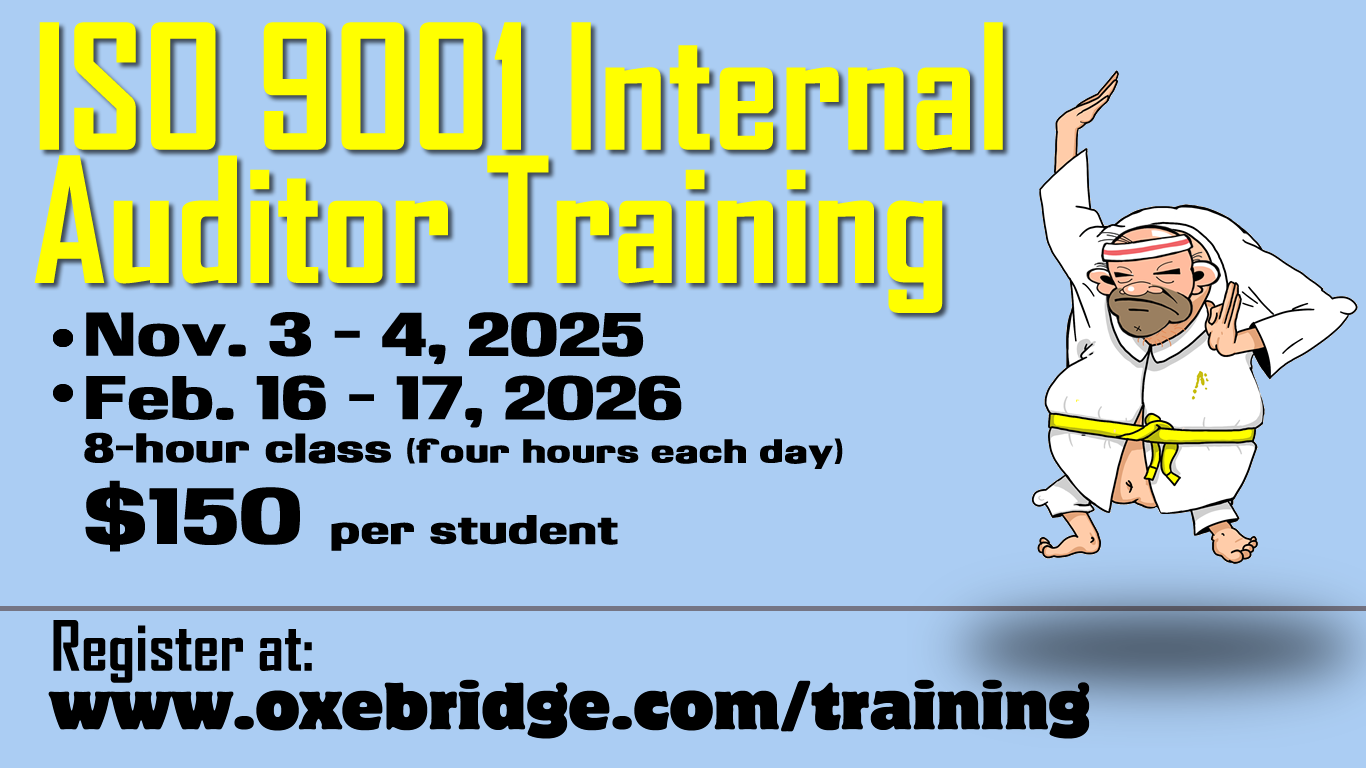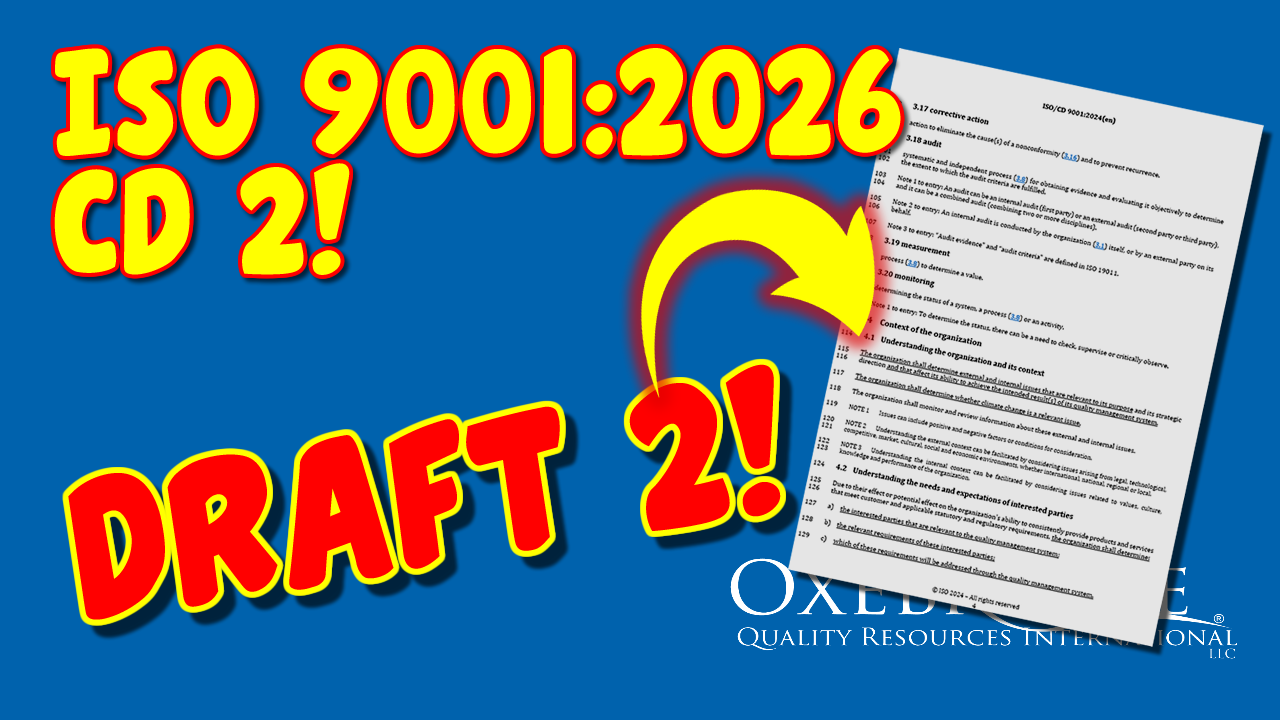 In his response to the Public Call for Temporary Cessation of Development of ISO 9001:2015, TC 176 Chair Dr. Gary Cort challenged the point that the new ISO 9001 revision is being developed without the Quality Management Principles finalized. The QMPs are supposed to be the guiding foundation for all development work, but Oxebridge learned that TC 176 proceeded with the development of the standard without QMP guidance.
In his response to the Public Call for Temporary Cessation of Development of ISO 9001:2015, TC 176 Chair Dr. Gary Cort challenged the point that the new ISO 9001 revision is being developed without the Quality Management Principles finalized. The QMPs are supposed to be the guiding foundation for all development work, but Oxebridge learned that TC 176 proceeded with the development of the standard without QMP guidance.
Dr. Cort challenged this assertion, saying:
[Oxebridge] claims that current work on the eight Quality Principles of ISO 9000 has not completed and that subsequent versions of ISO 9001 are at risk as a result. This is a gross misrepresentation of the facts. I personally appointed a task group at our plenary meeting in November 2010 to review the Quality Principles and charged them explicitly with identifying any obsolete Principles that needed to be eliminated, new Principles that needed to be added, or significant modifications required to existing Principles. The task group conducted an in-depth review of the Principles and reported to the 2011 plenary meeting that after thorough review, their recommendation was to retain the Quality Principles in their current state. Although some minor editorial changes were recommended to some of the Principles to improve clarity and reflect current vocabulary, the eight Quality Principles remain unchanged. While it is true that this editorial work has not been finalized, the implication that the Quality Principles are in flux and pose a risk to ongoing ISO 9001 development is, at best, misinformed.
But Oxebridge has received two official documents which refute Dr. Cort’s claim, and cast a shadow over his knowledge of what TC 176 is doing, and his level of participation.
The first is an official memo written by TC 176 / SC2 Chairman Dr. Nigel Croft, written to TC 176 Members. Dated April 30, 2013, Dr. Croft addresses the development of the QMPs directly, in a section titled “Ongoing Work of SC2 Working Groups and Task Groups”:
Joint SC2/SC1 TG on the Quality Management Principles: The ballot on the revised QMPs was comprehensively approved by SC2 Member bodies earlier this year, with 47 “approvals”; 3 “disapprovals” and 8 “abstentions.” I had the pleasure of taking part in the group’s recent meeting in Tokyo, which was aimed at addressing the comments received during the ballot, and to begin work on the revised QMP Brochure. The outputs of the work of this joint group have already provided important inputs into the work of WG24, and we are currently discussing the most appropriate publication date for the revised QMP Brochure.
(The full memo can be downloaded here.)
Per the Croft memo, we find that despite a ballot vote having been conducted, this occurred far after development of 9001 had already begun, rather than before.The Working Draft (WD) of ISO 9001:2015 was developed in November 2012, at least four months before the Ballot vote Dr. Croft refers to. Since then, SC2 has not only completed two Working Drafts (WD1 and WD2) but proceeded to Committee Draft (CD) using a controversial “fast track process” which, according to one TC 176 representative, violates TC 176’s own procedures.
A second, far more damning document is the QMP Working Group’s output, “Recommendation on the Revision of the Quality Management Principles“ dated August 2012. This document defines the latest changes to the QMPs, and dramatically contradicts Dr. Cort.
The Recommendation emphasizes, “This document introduces quality management principles on which the quality management system standards of ISO 9000 series are based.” This again proves that the QMPs are intended to be completed first, in order to drive development of the ISO 9000 series of standards, and not to be added after the drafts are already developed.
The document also reveals that the QMP work began as far back as June 2010 — not, as Dr. Cort says, November 2010 — and reveals that it took two years to generate the final recommendations, and which — per the Croft memo — have still not been fully converted into a QMP Brochure for use by the 9001 developers. This raises questions about the efficacy of ISO’s development process.
Finally, the document presents the changes to the QMPs, the first of which is a change from eight original QMPs to a revised set of seven:
- QMP 1 Customer Focus
- QMP 2 Leadership
- QMP 3 Engagement and Competence of People
- QMP 4 Process Approach
- QMP 5 Improvement
- QMP 6 Informed Decision Making
- QMP 7 Relationship Management
The Recommendation then goes on for 11 pages to define the revised principles. In one case, QMP7 was changed from “Mutually beneficial supplier relationships” t0 “Relationship Management,” a change justified by the QMP Working Group to “emphasize broader collaborations which go beyond the conventional supply chain relations.” It expands the scope of the QMP to include stakeholders “such as owners, employees, suppliers, financiers, local communities and society as a whole.”
Dr. Cort, in his response to the Oxebridge Public Call, made a number of claims which are now proven wholly untrue, based on TC 176’s own official documents:
- Dr. Cort asserted that, “The task group conducted an in-depth review of the Principles and reported to the 2011 plenary meeting that after thorough review, their recommendation was to retain the Quality Principles in their current state.” This is completely contrary to the Recommendation document which states, “In its first meeting held in Sydney in December 2010, the task group has reached consensus on the need for the change in the current QMPs.” The document defining the changes was then released in August 2012, after the plenary meeting referred to by Dr. Cort.
- Dr. Cort asserted that “the eight Quality Principles remain unchanged.” As evident by the official Working Group output, not only has the number of QMPs changed, the individual principles are significantly updated.
- Dr. Cort asserted that only “minor editorial changes were recommended to some of the Principles to improve clarity and reflect current vocabulary.” This is also untrue, as the change in scope of various QMPs — including QMP7, as shown — is far more significant than mere “editorial changes” or “vocabulary.”
Oxebridge has argued that the current TC 176 SC 2 leadership has been dismissive of the Quality Management Principles in favor of pushing ahead on a publishing schedule already delayed by slow development work. Oxebridge VP Operations Christopher Paris said, “This appears supported by the facts. In an ironic letter supporting the work of the TC 176 members, Dr. Cort resorts to dismissing the three years of work already done by the QMP team, and broadcasts to the world that their work is merely ‘editorial.’ They should be fuming.”
“Worse yet, it’s troubling that Dr. Cort would not know what the QMP task group is actually doing,” Paris continued. “It raises questions about who’s in charge.”
Christopher Paris is the founder and VP Operations of Oxebridge. He has over 35 years’ experience implementing ISO 9001 and AS9100 systems, and helps establish certification and accreditation bodies with the ISO 17000 series. He is a vocal advocate for the development and use of standards from the point of view of actual users. He is the writer and artist of THE AUDITOR comic strip, and is currently writing the DR. CUBA pulp novel series. Visit www.drcuba.world








